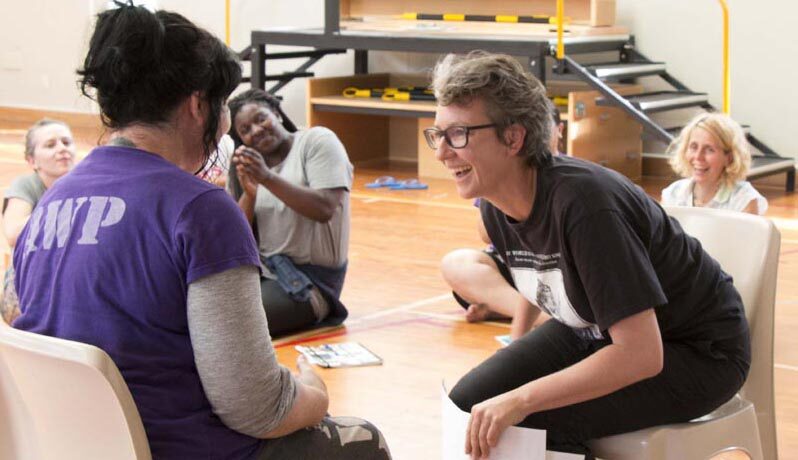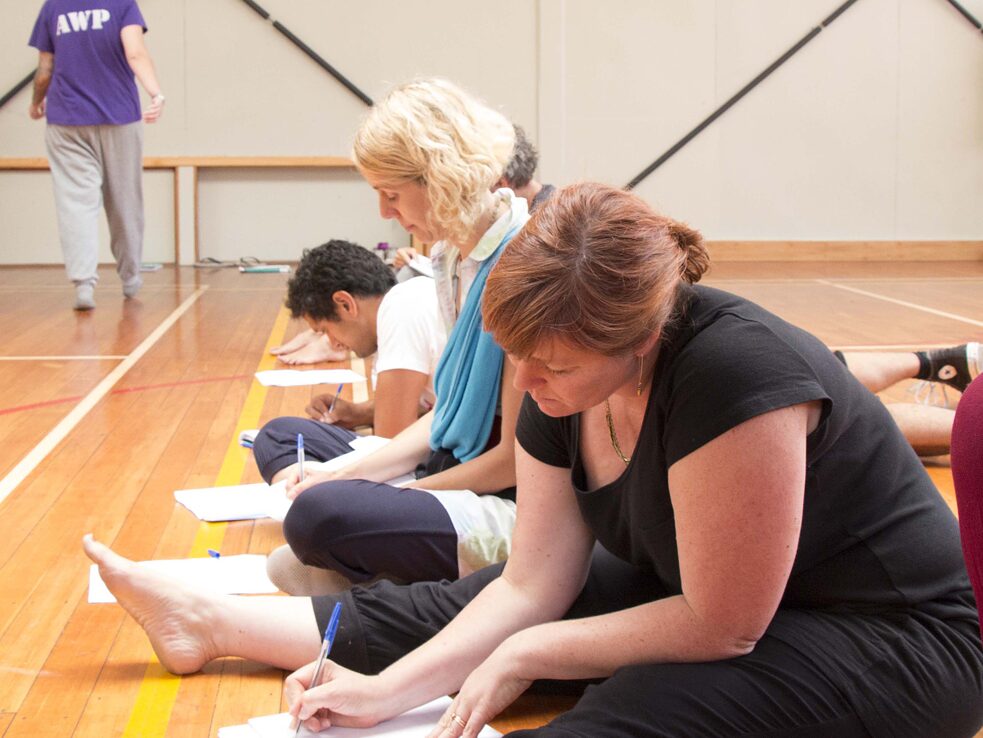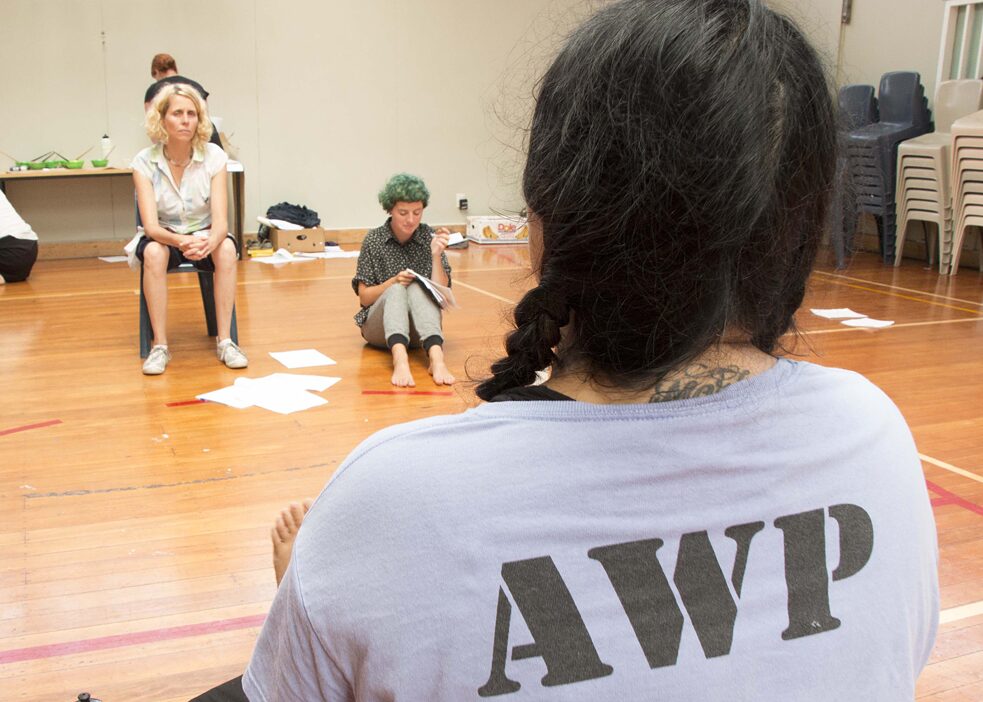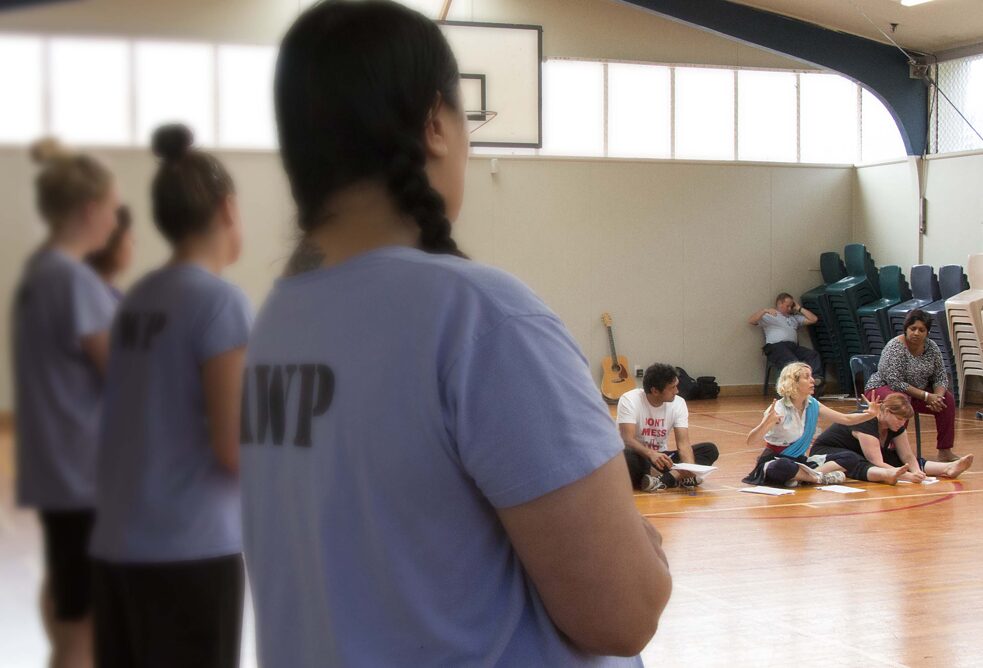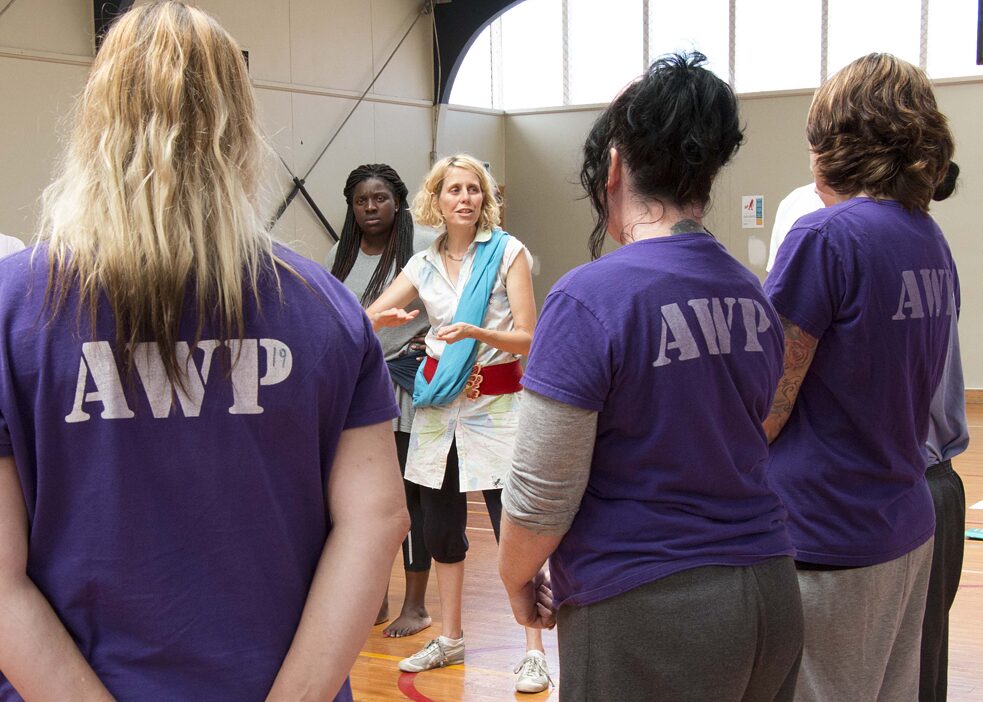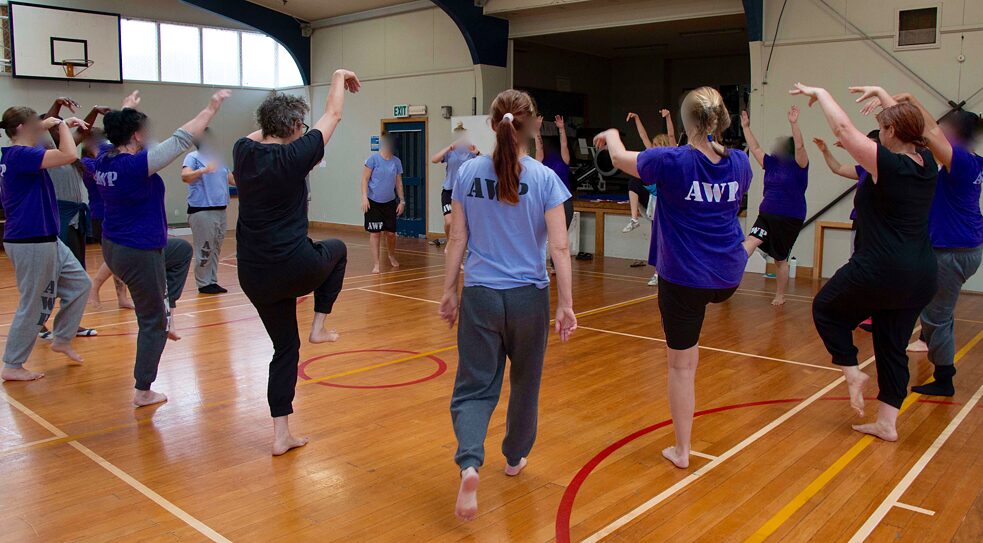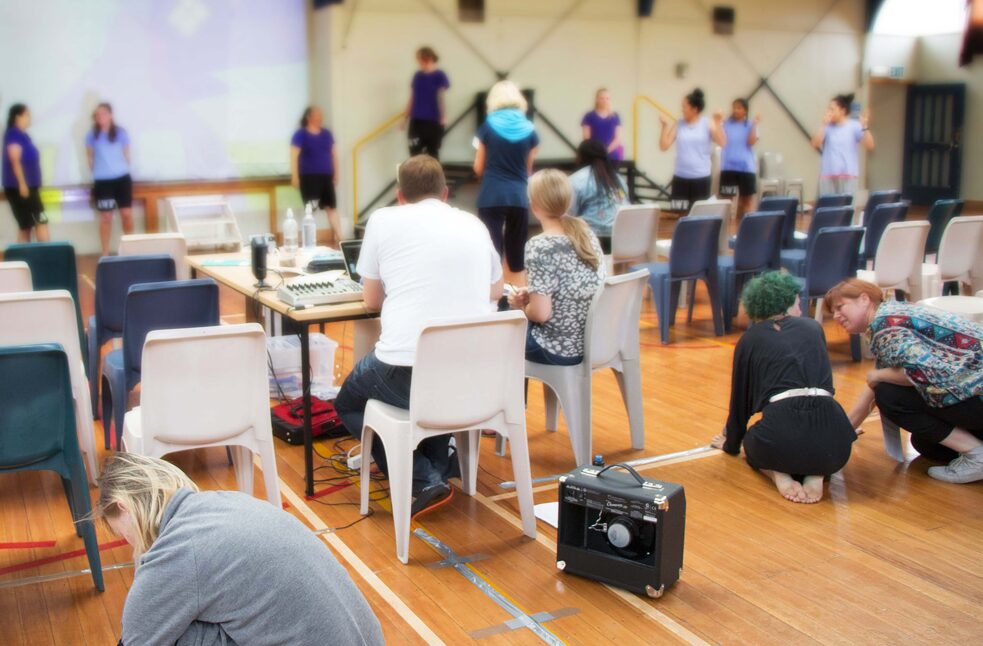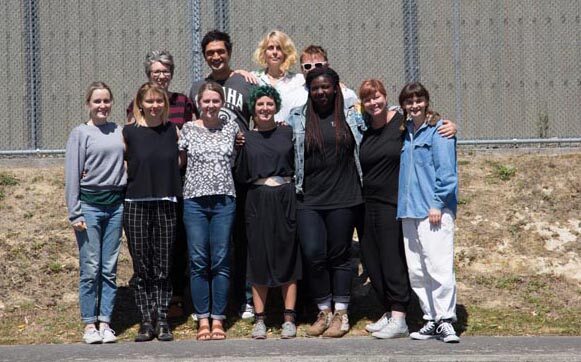40 Jahre Goethe-Institut Neuseeland
Jacqui Moyes
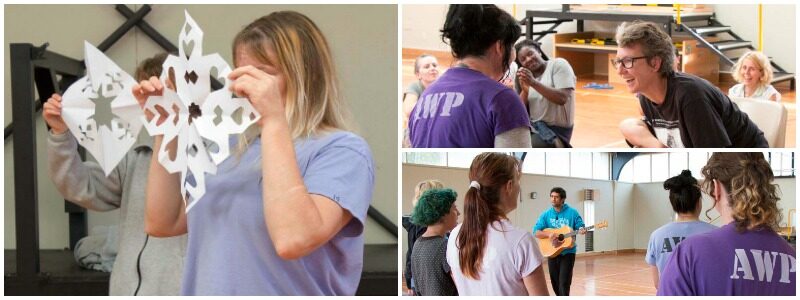
© Jacqui Moyes
The Looking Glass Project: Performing Arts in Prison 2015-2020
Sometimes we are lucky enough to find the people that we can make magic with. It is not always easy, and it is almost always very hard, creating something out of nothing can be excruciating – especially in a Prison.I met German Theatre Director Uta Plate in Wellington in 2015. She was a power house of the performing arts, direct and driven, and happy to make mad things happen. After a one day workshop in the Arohata Women’s prison, we decided we wanted to build a much bigger project together in 2016. We dreamed up a ‘Creativity in Corrections’ mission around New Zealand, in Wellington, Christchurch and Auckland. It was made possible by the Goethe-Institut New Zealand, Arts Access Aotearoa, and the Wellington City Council.
Our focus was a ten day workshop was held in Arohata Women’s Prison. We created the opportunity for sixteen incarcerated women to experience high-quality performing arts, work with awesome artists and create a 45 minute performance in a week! This is something that is very difficult to achieve in the New Zealand prison system.
The Goethe-Institut director at the time, Bettina Senff, was focused on sustainable community arts practice. She intended to plant the creative seeds which would then grow to support the creation of ongoing collaborations and projects. The ‘Looking Glass’ project created the strong foundation for what has now become the Home Ground Collective, a multi-disciplinary community arts initiative, working with women in the Justice system.
The spark for the Looking Glass project was a conversation with Anita Grafton, the Clinical manager of the Drug Treatment Unit. We talked about how women are expected to enter a treatment unit, and in the first week are asked to write their life stories and share it with clinicians. We both felt that this was such a massive and painful challenge.
Our personal stories are so complex, and with so many women having experienced significant trauma that the re-telling of life stories can be harrowing. We hoped to strengthen the women’s capacity to honour their own lived experience through creative practice. We wanted to encourage women to explore and share their own artistic identity, support their rehabilitation in the Drug Treatment Unit, and increase their resilience and community connectedness.
Ten artists were brought together from all sorts of disciplines and connections. Dan James was our audio visual artist. He had come to the project through Uta and his work on ‘The Song Dispensary’, also connected to the Goethe-Institut. Sandra Schmidt, our visual artist, was originally from East-Berlin. Jo Randerson from Barbarian Productions was our dramaturg, and Aimmee Martin was our Production Assistant. This was their first Prison project, but all of these artists still work with me today through the Home Ground Collective.
We created a devised performance, Come Listen to My Story of Wonderland. There was mime, mask, movement, poetry, drama, music and song as the women shared their stories of addiction and recovery.
One of the artists reflected “I was freaking out thinking the women in the prison would be disengaged with the project and it would be a constant struggle to keep them involved. How wrong could I be! I felt like the project was totally embraced and everyone got involved in different ways but also women commented on how they became a lot stronger as a community because of this project.”
The women felt inspired to continue working with creative methods. One said “What I want for my future is to live a crime-free, drug-free life, to be there for my family, and my children, and my children’s children. I am an expressive person and very creative in many forms and so many levels, so I found the whole experience every uplifting and enjoyable. I’m keen to pursue more of these workshops or anything to do with the arts, given the chance”.
Uta is passionate about collaborative projects, happy to share skills with local practitioners, and encourages people to find their voice, speak up and be heard. She worked so hard with us to create a piece of theatre that amplified the women’s voices and inspired the prison to see how hard artists work to build a community, and to share the skills of performing arts practice.
The Prison is a tough environment, and we often work with stories that are too painful to share. For me, Uta summed up our cultural practices and the differences in how we work. She reflected that Germans were like whales, deep-diving into the hard stories, able to be submerged down deep in the water for long periods of time. New Zealanders are like dolphins, we go deep, but have to come up regularly, breaking the surface with a joke and a laugh, this is how we cope with the hard times. Together it creates a balancing act, sorrow and joy dancing together.
Uta left New Zealand, but a few months later, we supported the women to re-create the show. They performed a new version called Alice through the Looking Glass. This new 25-minute performance was re-crafted by the women, using pieces from the original production.
At the end of 2016 we helped to create performances for the annual Arohata Prison Christmas concert. Stories were told of child abuse and abandonment in state care, domestic violence, drug addiction, going to prison and losing your children. The final piece was to the tune of Que Sera Sera, and spoke of intergenerational issues, with the resounding message of whatever will be, will be.
What started to grow during the Looking Glass project, is now the Home Ground Collective. Anita Grafton and I went on to co-design a creative wellbeing programme for women in the justice system. Many of us who first met through Uta and the Goethe-Institut – Anita, Dan, Aimmee, Sandra, Jo and myself, are involved. Women that were on the Looking Glass Project in 2016 who are still in prison, are still join our projects today in 2020!
Sadly, Anita passed away this year, but her legacy will live on in the work. She had the superpowers of unconditional love and support, and was a radical truth-telling optimist.
Anita’s clinical knowledge of working with women who have experienced significant trauma has meant that through the Looking Glass, and then Home Ground, we can honour the wisdom of lived experience of the justice system.
Home Ground uses creative arts practice, such as theatre, photography, creative writing and music, as a non-threatening, strengths-based approach to self-empowerment, community connectedness and wellbeing. We work in Arohata prison in Wellington and in the Community Corrections space, with women on community sentences.
We hope that Home Ground provides the foundation and the space for women in the justice system to feel valued and have a true sense of self. To have a voice, to be heard and understood.
Our promise is to enable women to learn about themselves and their life stories through creativity. We want women to have a better understanding of themselves so they can address their challenges and map out their future path.
By society and our community learning and understanding these stories, we are more able to welcome and support women to come home.
Huge thanks to our friends at the Goethe-Institut New Zealand for their help in increasing access to the arts inside our prisons, and for their ongoing commitment to creative community development in Aotearoa. The seeds they planted all those years ago, are still growing, still strong, and are committed to amplifying the voices of women affected by the justice system.
